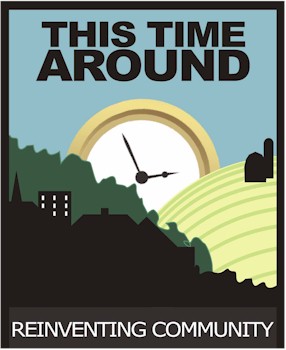|
|
This year long radio project
aired on WOUB (Athens, Ohio) in 2002-03.
It was designed to develop ways for the southeast Ohio region to come together to
take charge of its development through personal and civic action. It built upon the lessons from the past and
applied that knowledge to how the
people of the region could shape their future. WOUB worked with many
non-profit groups in the region to help shape the thrust of the series. This The Around: Reinventing Community was funded by the Appalachian Regional Commission and designed to create a model of how a region could use media to help it take charge of its development by encouraging personal and civic participation. One goal was to start a region-wide discussion of how residents in the region want this region to evolve, and about how its citizens could help determine that direction. The Appalachian Ohio region has a number of problems. Small towns exist in isolation and there is little communication between them so that common problems are not often discussed and are addressed by each community in isolation. But there is a common history – one of economic exploitation in the 19th and early 20th centuries, followed by a cycle of poverty and welfare dependence that the region is still reeling from. Towns do have their own newspapers and local radio stations but the one medium that reaches the entire region is WOUB- Ohio University’s public radio station. The series of 6-minute features aired as weekly local drop-ins to Morning Edition. The year was divided into four quarters and each quarter there was different theme. Each quarter ended with a call-in show where listeners could ask questions of in-studio guests about the quarter's topics. During the Call-in show we played excerpts from the series so the voices of local entrepreneurs could be heard. Here are the themes we used. Theme 1:
Creating Sustainable Communities. These features
will focus on creating links in listeners’ minds between the history of land
use in the region and changes that are occurring here now. For decades,
extractive industries took resources (and money) out of the region. It will
also look at farming and how, once mechanization of farming came about, the
hilly farms here were no longer profitable. Today people are beginning to
think differently about how to use land. Now, entrepreneurs are trying to
find examples of development efforts that keep money in the area, and export
intellectual and material products.
Theme 2: Technology.
Technology has always had an impact to the region. Improvements in mining
techniques led to decades of coal exploitation. Changes in transportation -
canals, then railroads, then highways, brought better ways to get goods to
market. However, the region has also learned that not having adequate
transportation can mean being left behind. Now, new changes in technology
have the potential to have the same impact on the region. Theme 3:
Creating Community. What is a community? How does
it develop and grow? Does a community have to be a geographic place? These
issues will be examined in this quarter. Theme 4: Taking
Charge of Change. What are traditional values?
What makes a community a home? Can policy makers balance the demands of a
more vibrant economy and retain the things that make small towns and rural
areas great places to live?
The series This Time Around: Reinventing Community won three awards:
|
